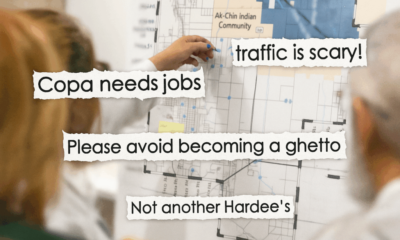Business
Tucson City Council Turns Its Back on Key Supporters

A tense dispute between a publicist and an agent over an actor’s future developments drew attention during a lunch meeting, ultimately resulting in an unexpected confrontation. The actor attempted to mediate the discord, but tensions escalated, culminating in the agent striking the actor. This incident sheds light on the ongoing friction between the Tucson City Council and Pima County, reminiscent of the agent-publicist dynamic.
In a recent study session, the City Council discussed the fiscal year 2025-26 budget, proposing to withdraw its $750,000 contribution to the Pima County Early Education Program Scholarships. Funded primarily through the Library District tax, this program offers critical educational opportunities for families ineligible for Head Start yet unable to afford private preschools.
Historically, the early education initiative has relied on collaborative funding, with Pima County primarily footing the bill. Although the Tucson budget totals $2.5 billion, council members expressed a desire to distance themselves from the partnership. Councilmember Paul Cunningham proposed a phased withdrawal, suggesting a reduction to half the contribution over the next year and complete elimination the following year.
Ultimately, the Council leaned towards Councilmember Nikki Lee’s recommendation to allocate just $250,000 from an unused fund, stating that the Library District represents a county obligation rather than a city priority. This stance raises questions about the Council’s commitment to regional cooperation.
The current move against the Early Education Program disregards past collaborations. In 2003, during a budget crisis, Tucson relied on Pima County’s support to manage its library system, saving millions over the years. Walking away from its current contribution signals a lack of regard for this history and the families who depend on the program’s resources.
The issue extends beyond education funding. The Regional Transportation Authority (RTA) similarly finds itself at risk as Tucson City Council debates diverting additional local tax revenues. This decision threatens to undermine the very framework designed to support regional transportation efforts, jeopardizing vital projects in Tucson and surrounding areas.
With the city facing challenges such as homelessness and infrastructure needs, cooperation between jurisdictions becomes critical. Both the city and county have exhibited reluctance to collaborate, with recent controversies over transit services highlighting the strain in their relationship. The Council’s decisions could inadvertently harm its residents and the broader community they serve.
Moving forward, the City Council would benefit from embracing a unified approach. Effective governance in Arizona often requires intergovernmental cooperation—a necessity that fosters long-term benefits for families and communities across the region.


















